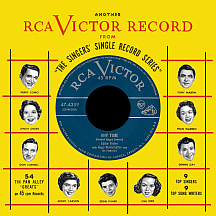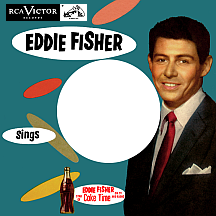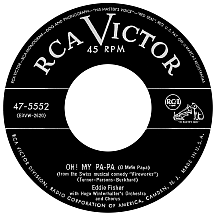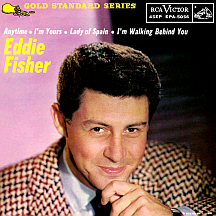EDDIE FISHER
Among the most successful male singers of the 1950s, Eddie Fisher ranks very near the top. During the decade's first half (with Nat "King" Cole in the rapid process of building his solo career and Frank Sinatra striving to overcome a temporary slump), his only formidable competiton came from RCA Victor labelmate Perry Como, who'd had a head start and was showing no signs of slowing down. Eddie was born with a "golden voice"...and, some have said, little else (besides obvious teen idol looks). His musical timing, for example, was nearly nonexistent, as his rhythmically-challenged delivery frequently drifted through numbers at its own pace, a frustrating hindrance to many a fine musical accompanist. Critics weren't thrilled with what they heard; his less-discerning fan base, on the other hand, didn't seem to mind. He racked up many millions in record sales in just a few years' time.
Personal discipline was an issue for Eddie; he didn't seem to possess a "stop" button when it came to drinking, drug use and especially gambling. Women were his most high-profile problem; he took advantage of every opportunity he could fit into his already-tight schedule. And when he fell in..."love," he always managed to complicate matters, as did his partners, none of whom, for varying reasons, proved compatible to any sort of long-term relationship.
Born in Philadelphia in 1928, Edwin Jack Tisch's father, Joseph, was a Jewish immigrant who left Russia around the time the first World War was breaking out. A day laborer, tailor in a sweatshop, unsuccessful delicatessen owner and later a street vendor who sold fruits and vegetables, Eddie remembered him mainly as a loud, abusive father and husband. Though the family (seven children including Eddie) lived in extreme poverty, his loving mother, Kate, was a supporter of her son's singing, starting at age four when he won a local talent contest. He sang regularly in synagogue and began performing on local radio at age 13. People called him "Sonny Boy" because of similarities to Al Jolson's style of singing. He appeared in local theaters and nightclubs for the next few years. His schooling ended at South Philly High in the Lower Moyamensing neighborhood, but he didn't graduate.
Just after the end of World War II, when Eddie was 17, he was hired to sing in Buddy Morrow's band. Securing the services of an agent, he made a trip to New York in '46 and joined Charlie Ventura's band. Eddie took the top prize on a radio episode of Arthur Godfrey's Talent Scouts in 1948 (several months before the show's television premiere on CBS). This led to his first recording with The Marlin Sisters (real names: Goldie and Gittele Malavsky), "You Can't Be True, Dear," on Columbia Records, a top 20 hit in June '48 (a version by organist Ken Griffin with vocalist Jerry Wayne reached number one at the same time). After seeing Fisher perform at Grossinger's Resort Hotel in the Catskills in 1949, superstar Eddie Cantor (also Jewish) added him to his tour, which included a regular spot on his NBC radio program. As Fisher's profile rose, record labels showed interest; he signed with RCA Victor that same year.
After several single releases over the space of several months, Eddie scored his first hit late in 1950, reaching the top ten with a remake of a 23-year-old song, "Thinking of You," featured in the musical Three Little Words, a biopic focusing on Tin Pan Alley songwriters Bert Kalmar and Harry Ruby (18-year-old Debbie Reynolds had a small role in the film). The band on Fisher's recording was led by Hugo Winterhalter, who for many years arranged and orchestrated Eddie's hits-to-come. In early '51 he had another hit single, "Bring Back the Thrill." Other top sellers that year included "Unless" and a cover of Eddy Arnold's C&W hit "I'll Hold You in My Heart ('Til I Can Hold You in My Arms)." When "Turn Back the Hands of Time" began its rise to the top ten, something happened that should have put Eddie's career on hold for awhile: he was inducted into the U.S. Army at the height of the Korean war.
As a private first class, he served his time singing with the United States Army Band in the U.S. and Korea. Publicity photos in uniform further sparked the imaginations of his ever-growing legion of female fans. While on furlough, he made fresh new studio recordings and appeared on the top TV shows. "Any Time," a song written by Herbert Happy Lawson that had been a hit for Arnold in '48, became Fisher's biggest seller yet at the peak of his armed service. 1952, in fact, was his hottest year, with "Tell Me Why," "Forgive Me," "I'm Yours," "Wish You Were Here," "Lady of Spain" and a duet with Como, "Maybe," also reaching the top ten, as total sales approached the ten million figure. At the time of his discharge in 1953, he was one of the hottest stars in America. In April, he debuted a 15-minute TV series, Coke Time, and it was so popular that the Coca-Cola company offered him an extended million dollar contract to endorse the soft drink. He was nominated for two Emmy awards in the category Best Male Singer for his work on the show and later won a Golden Globe for his final season of the series.
Fisher's star power soared even higher that summer with a number one hit, "I'm Walking Behind You," penned by British bandleader Billy Reid. Eddie rounded out the year with two more top ten singles, "With These Hands" and "Many Times." The biggest hit of his career came in early 1954; "Oh! My Pa-Pa," its melody written by Swiss composer Paul Burkhard, was published in Germany in 1939 as "O Mein Papa" and used in two musical productions prior to its inclusion in the '54 German film Fireworks starring Lilli Palmer. An instrumental version by trumpeter Eddie Calvert achieved a two-month run at number one in the U.K. just as Fisher's vocal recording (with English lyrics by John Turner and Geoffrey Parsons, using the pen name John Sexton) paralleled its run in the U.S. during January and February. The song's popularity created an uncomfortable situation, as his relationship with his own father had never been a loving one. He later admitted that when he sang lyrics like '...no one could be so gentle and so lovable,' he was doing the best acting of his career.
1954 continued strong with two more top tens, "A Girl, A Girl" and a Hugo Winterhalter single, "The Little Shoemaker," giving label credit to "A Friend" who happened to be Fisher, his vocal a part of the chorus rather than solo. Then his third number one best seller, "I Need You Now," reached the apex in November, followed by the top ten "Count Your Blessings (Instead of Sheep)." But a downward slide began in 1955; not one release managed a top ten showing, his biggest that year being the Dick Adler-Jerry Ross composition "Heart" (as in 'Ya gotta have...'). The hot news item was his marriage to Debbie Reynolds, a union he had doubts about due in part to a tendency she had towards quarreling...to put it kindly. They had met a few years earlier while entertaining troops and their paths crossed on a number of occasions afterwards, leading to a rather hesitant stride to the altar. Friends, family and other celebrities close to them had misgivings (including Debbie's good friend Elizabeth Taylor, who she'd known since they were teenage stars in the late '40s), but all the public could see was the "perfect couple."
Eddie's record sales reversed course in '56 as he landed two more top tens: "Dungaree Doll," playing on the military gimmick he'd been so famous for a few years earlier, and a late-year cover of "Cindy, Oh Cindy," an island folk tune that was also a top seller for Vince Martin and the Tarriers. In between he appeared on the March TV broadcast of the Academy Awards singing "Love is a Many-Splendored Thing" (despite The Four Aces, who'd had a major hit with it, being the logical choice). He made the jump into film acting, starring with Debbie in Bundle of Joy, amazingly getting top billing over his movie star wife! A duet, "Lullaby in Blue" (lyrics like 'How I love my pretty baby' referring to the newborn child of the film's title), was released on an RCA Victor single, the couple's only musical collaboration. As cute as the song is, the film as a whole reveals serious flaws in Fisher's acting ability and it seemed unlikely he would be getting another big screen role in the foreseeable future.
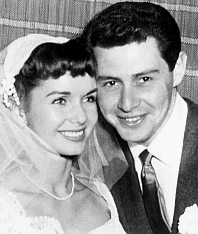
Though sales of his records resumed the downward trend, getting even worse in 1957, his star power on television had not diminished. Coke Time was canceled and in the fall, The Eddie Fisher Show premiered, an hourlong variety series on the same network, NBC, alternating bi-weekly with The George Gobel Show, just like the two stars had done during part of the run of Coke Time. Comedian Gobel frequently appeared on Fisher's show and vice-versa. Eddie's series ended in March 1959, while George continued another year, alternating with the long-running Jack Benny Program.
With his fame, impressive record sales, standing-room-only live shows and lucrative endorsement deals, Eddie earned a literal fortune (20 million throughout his lifetime, or so he claimed). But there was a catch. A lack of discipline had led to a serious drinking problem, then an ongoing drug habit (at one point he was getting injections, first an unknown serum from a shady doctor, later expensive shots of liquid cocaine from an even less-reliable connection). To top it off, he'd been gambling for years in private games, but his success as a headliner in Las Vegas opened the door to a more frenetic, higher-stakes type of casino gambling that wiped out his finances (and then he earned more money, then he lost it again, and so on). Debbie turned a blind eye to these vices, which included a string of affairs, some of them with stars that covered a cross-section of the entertainment business. There was no stopping Eddie Fisher. He was a junkie on several levels, not all of them drug-related.
Here's what happened next: Debbie and Elizabeth Taylor became closer than ever. Liz, just 26 years old in 1958, was on her third marriage already, to film producer Mike Todd (best-known for his Oscar-winning Around the World in 80 Days). The two couples frequently "did the town" together. Mike even gambled with Eddie at the casinos. Then Mike died in a private plane crash in New Mexico in March 1958, a little over a year after the marriage had begun. Eddie rushed to Liz's side to comfort her...and Debbie was okay with it. But who could resist Taylor's charms? Within weeks he left Deb high and dry and they were divorced about a year later. It became one of the most-publicized scandals in entertainment history. In May 1959, he married Taylor. In Suddenly, Last Summer, which premiered in theaters near the end of the year, Liz gave a performance that got her a third consecutive Oscar nomination for Best Actress (and third loss). Eddie even finagled a small, uncredited part in the film.
Fisher's association with RCA Victor Records ended in late 1959. He started his own label, Ramrod, but had little success with it, releasing only two singles and two albums. At that time he secured a role in Taylor's latest film, Butterfield 8...which she initially didn't want to make. But she won the Academy Award this time on her fourth try. Eddie's role, on the other hand, wasn't well-received by critics, though by default it stands as his best peformance among a minimal body of work. His acting career essentially ended, though he had hopes of becoming a film producer. But his numerous vices sidetracked that dream.
Continuing to focus on singing and nightclub work, he recorded Leonard Bernstein and Stephen Sondheim's "Tonight" from West Side Story, covering the song just as the blockbuster musical film and eventual winner of ten Academy Awards made it to theaters in the fall of 1961. To the surprise of many, his version on 7 Arts Records was a mid-chart success, falling just shy of the top 40. This put him back in demand for TV appearances, usually on talk shows like Mike Douglas, Merv Griffin and The Tonight Show. He signed a contract with the ABC-Paramount label that yielded a briefly-charting single, "Arrivederci, Roma," but his contract was canceled within a year.
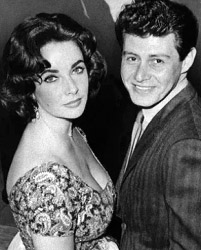
He and Elizabeth had managed to reach their third wedding anniversary, during which time she tolerated his quirks and even fed his addictions (like paying off a few five-to-six-figure gambling debts) before complications ensued. During the long filming schedule of Cleopatra, the most expensive Hollywood production to that time, she began an affair with co-star Richard Burton. It wasn't that Eddie was a particularly good husband...after all, he'd only slightly dialed down his bouts of drinking, drug use and gambling, though he swore devotion to his second wife. So, was he the victim this time? The public's opinions were all over the road and sales of tabloid publications went through the roof with this second headline-making scandal involving Liz and Eddie.
The Fisher-Taylor divorce became final in 1964 (as did Richard's from wife Sybil) and the Burton-Taylor marriage took place shortly afterwards. But that's a another story with its own level of calamity; suffice it to say, supermarket tabloid sales remained brisk for years to come. Fisher, grief-stricken over the split, consoled himself with the things that gave him comfort: booze, pills, games of chance and plenty of female companionship - there never seemed to be a shortage. He could still get himself together to do stage shows on a regular basis and the money kept replenishing itself. A short stint with Dot Records in '65 resulted in a couple of minor airplay singles on the popular, possibly-interchangeable "easy listening" and "middle-of-the-road" stations of the era.
In 1966 he re-signed with RCA Victor and another mid-chart single appeared that fall (plus it went to number two on the aforementioned "easy" charts!); "Games That Lovers Play" benefited from an arrangement by Nelson Riddle and included a brief Sinatra-esque 'doo-be-doo-be-doo' imitation on the fade. A similar follow-up, "People Like You" (penned by Larry Kusik and Eddie Snyder, who'd collaborated with James Last on "Games"), prevented a one-and-done situation (it reached the EL top five in early '67). He stuck it out with RCA another year, then recorded "I'll Pick a Rose For My Rose" for Musicor in 1969. And that pretty much summed up his recording career.
His marriage to Connie Stevens (of Hawaiian Eye and "Sixteen Reasons" fame) lasted just two years (1967 to '69) but gave him two daughters to add to the girl and boy he'd had with Debbie. Connie got off a little easier than the previous wives, as Eddie's bad habits were somewhat less problematic than earlier in the decade. Failed efforts to fuel the career kept him mostly out of the spotlight in the 1970s, during which time he had a fourth marriage, to 25-years-younger beauty queen Terry Richard, that lasted only a few months (the courtship was longer than the marriage). In the '80s he resumed performing in Vegas, drawing on the knack he seemed to have for "maintaining" in front of audiences. In the '90s he married a fifth time (to Betty Lin) and they might have been in it for the long haul if she hadn't passed away several years later. His drug addictions were hard to shake; there was a stretch where he was getting high with his daughter, Carrie Fisher (the famous Princess Leia of Star Wars who was also an accomplished author who sometimes wrote about her screwed-up parents).
His death came in 2010, not as a result of any vices, but from a less likely source: complications that arose after a routine hip surgery. Today his many hit recordings are probably not what he's most known for, having been overshadowed by his real-life experiences. Eddie Fisher is one of the all-time tabloid kings. If remaining in the public eye for decades is the sign of a superstar, then he certainly was one. But for all the wrong reasons.
NOTABLE SINGLES:
- You Can't Be True, Dear - 1948
by the Marlin Sisters with Eddie Fisher - Where in the World - 1950
- Thinking of You - 1950
- Bring Back the Thrill - 1951
- Unless - 1951
- I'll Hold You in My Heart - 1951
- Turn Back the Hands of Time - 1951
- Any Time - 1952
- Tell Me Why /
Trust in Me - 1952 - Forgive Me /
That's the Chance You Take - 1952 - I Remember When - 1952
- I'm Yours /
Just a Little Lovin' (Will Go a Long Way) - 1952 - Maybe - 1952
by Perry Como and Eddie Fisher / - Watermelon Weather - 1952
by Perry Como and Eddie Fisher - Wish You Were Here /
The Hand of Fate - 1952 - Everything I Have is Yours - 1952
- Lady of Spain /
Outside of Heaven - 1952 - Even Now - 1953
- Downhearted /
How Do You Speak to an Angel? - 1953 - I'm Walking Behind You - 1953
- With These Hands - 1953
- Many Times - 1953
- Oh! My Pa-Pa (O Mein Papa) - 1954
- A Girl, A Girl /
Anema e Core - 1954 - Green Years - 1954
- The Little Shoemaker - 1954
by Hugo Winterhalter's Orchestra and Chorus and a Friend / - The Magic Tango - 1954
by Hugo Winterhalter's Orchestra and Chorus and a Friend - I Need You Now - 1954
- Count Your Blessings (Instead of Sheep) - 1954
- A Man Chases a Girl (Until She Catches Him) - 1955
- Heart - 1955
- Song of the Dreamer - 1955
- Magic Fingers - 1955
by Eddie Fisher with Hugo Winterhalter / - I Wanna Go Where You Go, Do What You Do (Then I'll Be Happy) - 1955
- Dungaree Doll /
Everybody's Got a Home But Me - 1956 - Without You /
No Other One - 1956 - On the Street Where You Live /
Sweet Heartaches - 1956 - Oh My Maria - 1956
- Cindy, Oh Cindy - 1956
- Some Day Soon - 1956
- Lullaby in Blue - 1957
by Debbie Reynolds and Eddie Fisher - Tonight My Heart Will Be Crying - 1957
- Sunshine Girl - 1957
- Sayonara - 1957
- Scent of Mystery - 1959
- Summertime Love - 1960
- Tonight - 1961
- Arrivederci, Roma - 1962
- Sunrise, Sunset - 1965
- Young and Foolish - 1965
- Games That Lovers Play - 1966
- People Like You - 1967
- Now I Know - 1967
- I'll Pick a Rose For My Rose - 1969


